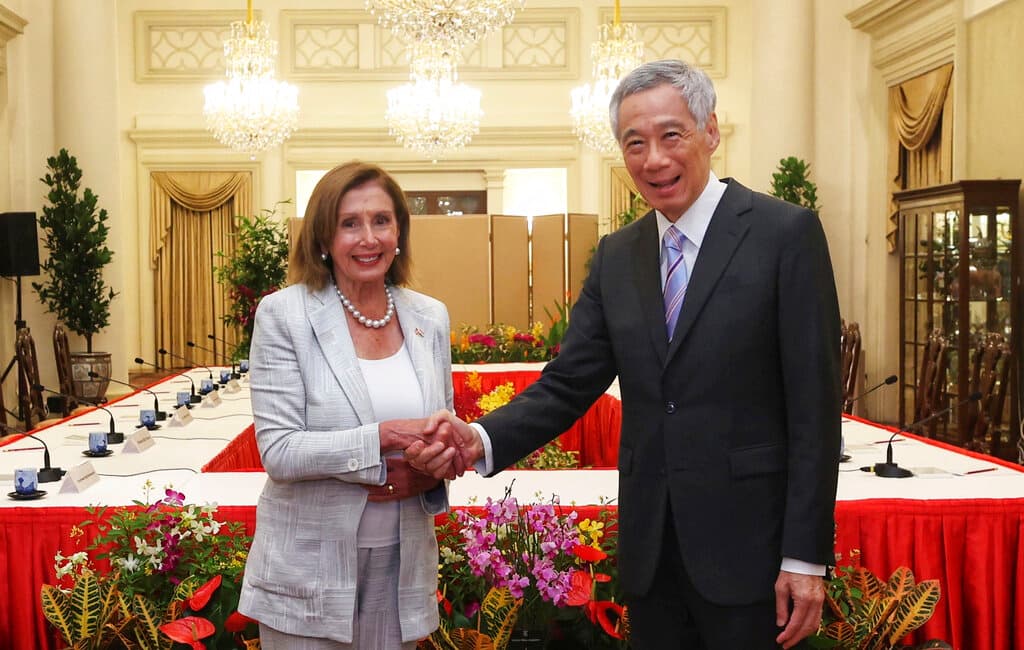USS Ronald Reagan Steaming Northward as Pelosi Reportedly Prepares To Land in Free China Tuesday
The Communist regime on the mainland hopes ‘consequences’ can be avoided.

SEOUL — The speaker of the House, Nancy Pelosi, is determined to fly Tuesday to the Republic of China on Taiwan in defiance of threats from Beijing and the qualms of President Biden and other American officials about the wisdom of defying the Communist regime on the mainland.
That’s the word being widely circulated today. Both CNN and BBC are quoting sources in Washington and Taiwan as saying that Mrs. Pelosi would be sleeping Tuesday in Taiwan, ready to meet Taiwan officials after she gets there Tuesday night and again Wednesday morning before going on the next leg of an East Asian Odyssey.
Taiwanese officials spread the word of her pending visit among the main Chinese news outlets, which reported that the speaker would go to Taipei from Kuala Lumpur, the second stop on her trip through the region. Her schedule also includes stops in South Korea and Japan.
The other five members of Congress in Mrs. Pelosi’s delegation are expected to be accompanying her, but that’s not confirmed. They, like her, are under tremendous pressure from within the administration and also from Chinese diplomats in Washington and San Francisco not to visit the island state.
Taiwan is technically a province of China even though it functions independently from the Communist regime in Beijing. It is controlled by the Republic of China government, whose parliament, known as the Legislative Yuan, once had seats for all of the provinces of China.
Mrs. Pelosi during her visit will undoubtedly praise the Taiwanese leadership for governing a democracy of 23.5 million people whose freedom is constantly threatened by forces from mainland China, just 100 miles away across the Taiwan Straits. She is still remembered for having visited Beijing in 1991, two years after the massacre at Tiananmen Square, and unfurling a banner inscribed with the words, “To those who died for democracy in China.”
Mrs. Pelosi did not announce that Taiwan would be on her schedule when she began her four- — or five- — nation tour by flying to Singapore, the first stop on her itinerary. She’s believed, though, to be eager to demonstrate personally that she won’t be intimidated by Communist China’s party boss, Xi Jinping, and communist officials.
Mr. Xi, in a telephone conversation with President Biden that lasted more than two hours, failed to mention Mrs. Pelosi by name but warned against “playing with fire” on Taiwan. Chinese diplomats have been working furiously to try to convince everyone within earshot of the dangers of the trip.
“We have made our stance loud and clear,” the spokesman for the Chinese embassy in Washington, Liu Pengyu, said, as quoted by CNN. “We hope serious consequences could be avoided … in the common interests of both China and the U.S.”
What “consequences” could the Chinese have in mind? Blocking Free Chinese ports, firing missiles into the sea, sending warplanes into Free Chinese air space, cutting off trade with Taiwan and maybe America, too — these are all possibilities raised by the specter of Mrs. Pelosi in Taiwan.
Another option, of course, is that the Communist Chinese could simply repeat its claim to Taiwan, to which Chiang Kai-shek’s defeated forces fled after the victory of Mao’s Red Army on the mainland in 1949, and not go much beyond familiar rhetoric.
One consequence that’s really not expected, however, is overt military action. Famous last words, but there’s still no sign of the kind of military build-up needed for an invasion of the island, shielded not only by the Taiwan Straits but also by America’s commitment, most recently reiterated by Mr. Biden during his visit to Tokyo and Seoul in May, to defend Taiwan.
America has no military forces, or advisers, on Taiwan and maintains relations through what’s called the Americana Institute in Taipei. Taiwan, though, still imports hundreds of millions of dollars’ worth of American arms every year. Formally, Washington has maintained a “one China” policy.
That has obtained ever since President Carter transferred diplomatic recognition to Communist China from Free China in 1978. Mr. Biden has emphasized the need for “strategic ambiguity,” meaning Washington is playing it both ways, recognizing Beijing but still remaining close to Taiwan.
The ambiguous nature of this policy should be eminently clear while Mrs. Pelosi and her delegation are there. Washington reportedly is sending warplanes around the island, just in case any problem should arise. United States Ship Ronald Reagan, an aircraft carrier accompanied by destroyers and supply vessels, has just left Singapore on its way northward.
That mission is all in support of a “free and open Indo-Pacific region,” according to a Department of Defense publicity leaflet — the same reason Ms. Pelosi insists on going to Taiwan.

